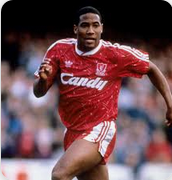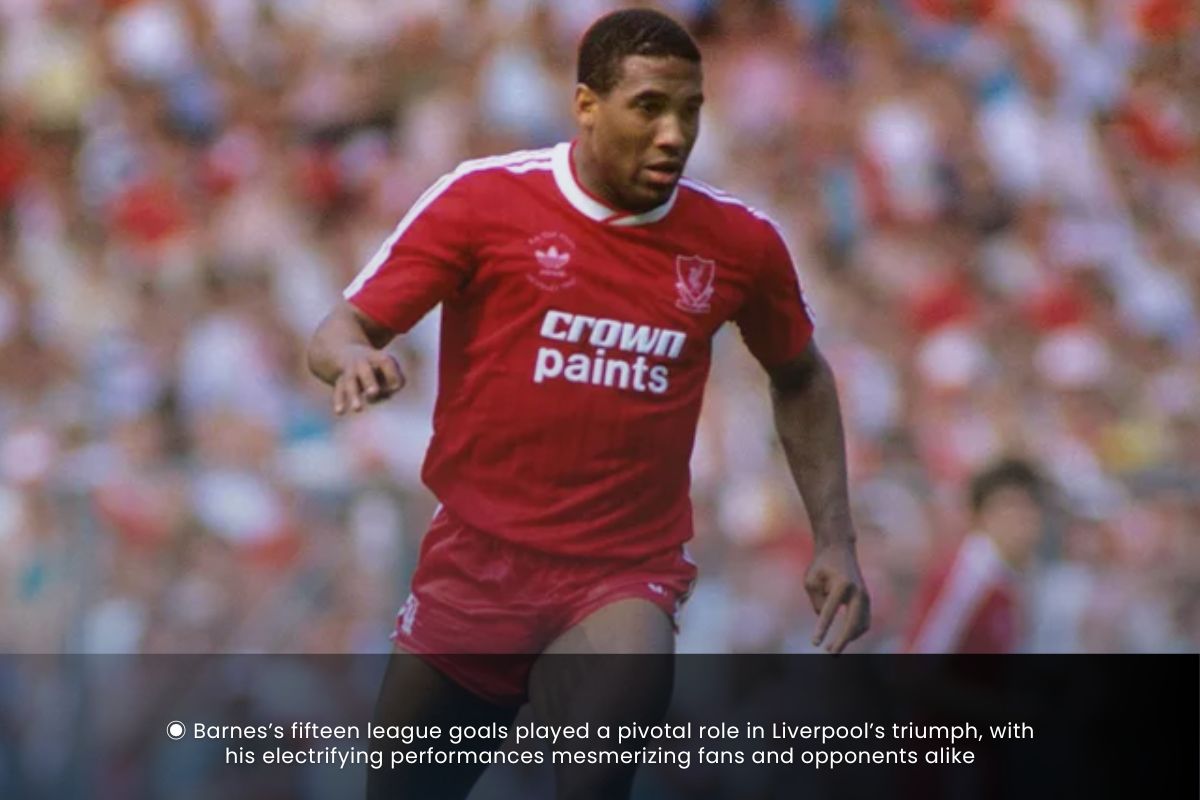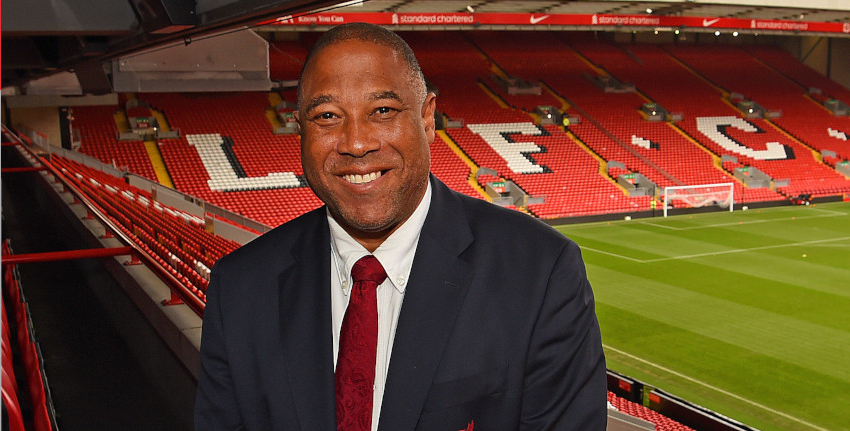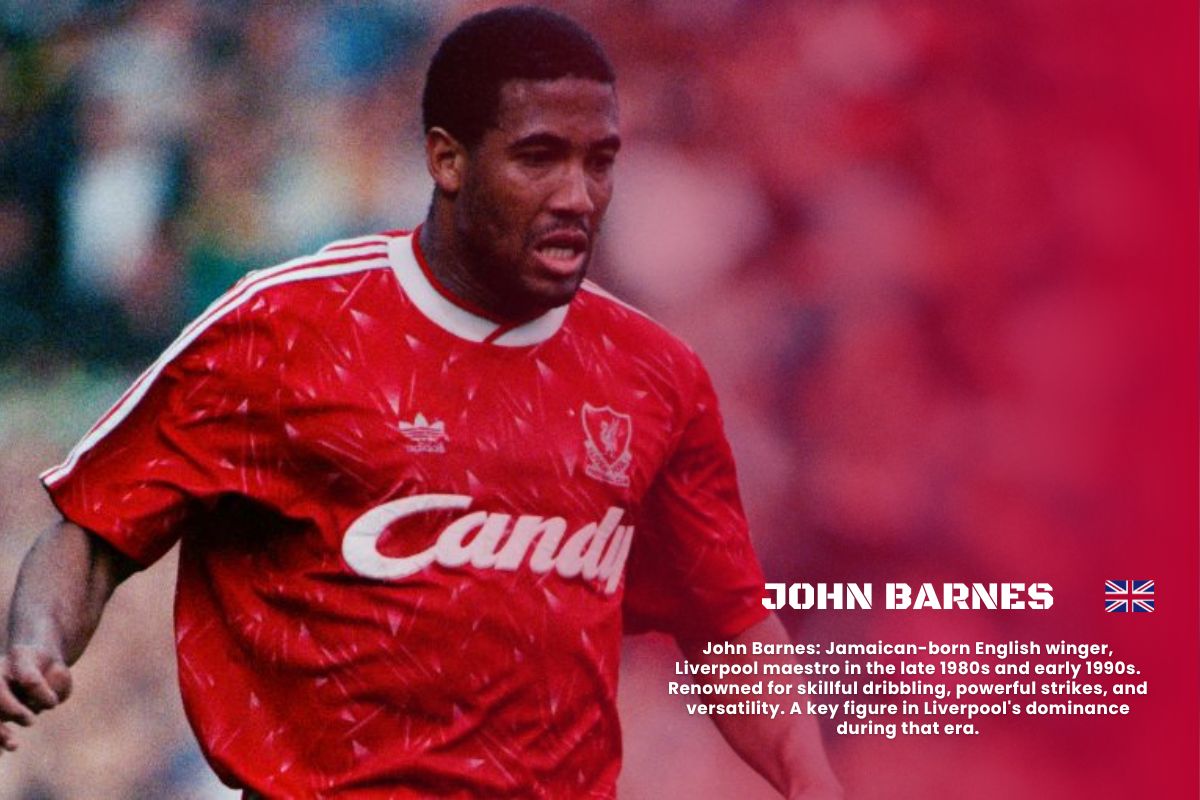
- DOB/Age: 7th Nov 1963; 60 years old
- Nationality: British, Jamaican
- Height: 1.81m
- Position: Winger
- Signed/Debut: 1987; Liverpool FC
After visiting Billy Liddell’s profile, today we shift gears to learn more about John Barnes, a former Liverpool left winger before the millennium. During his illustrious tenure at Liverpool FC, John Barnes solidified his status as one of the club’s most iconic figures. Joining the Reds in 1987, Barnes electrified Anfield with his dazzling displays, earning accolades including two League titles and two FA Cups. Renowned for his versatility and flair, Barnes left an indelible mark, etching his name into Liverpool folklore. Stay tuned as we delve deeper into his remarkable journey, exploring pivotal moments and the enduring legacy he carved at Anfield.
Early Life and Career
John Barnes was born on November 7, 1963, in Jamaica, to Roderick Kenrick “Ken” Barnes, a Trinidadian military officer, and Frances Jeanne Hill, a Jamaican. Raised in Jamaica’s military base, Barnes was immersed in a disciplined environment. His father’s passion for sports, particularly football, inspired Barnes to pursue athletics. Relocating to London at the age of 12, he attended St. Marylebone Grammar School and later played youth football at the Stowe Boys Club.
John Barnes’s talent didn’t go unnoticed, as he caught the eye of Watford while playing for Sudbury Court. Signed in 1981, he made his debut at 17, swiftly establishing himself as a key player. His standout performances helped Watford secure promotion to the top flight in 1982. Despite challenges, including a loss in the 1984 FA Cup final, Barnes’s skill and determination propelled him into the spotlight, setting the stage for his remarkable journey to Liverpool FC.
Career at Liverpool
John Barnes’s arrival at Liverpool in 1987 heralded a new era of creativity and flair at Anfield. With his exceptional dribbling ability, vision, and deadly left foot, Barnes brought a dynamic edge to Liverpool’s attacking play. His partnership with fellow England international Peter Beardsley and the prolific Ian Rush provided the Reds with a formidable attacking trio.
Described by teammate Peter Beardsley as “the best player I ever played with, bar none,” Barnes’s influence extended beyond his brilliance. His tactical intelligence and versatility allowed him to seamlessly adapt to different formations and opponents. Whether deployed on the left wing or in a central midfield role, Barnes’s ability to dictate the tempo of the game and unlock defenses made him a linchpin in Liverpool’s success.
Manager Kenny Dalglish recognized Barnes’s importance, entrusting him with the responsibility of orchestrating Liverpool’s attacking moves. His knack for creating opportunities for teammates, showcased in the 1989 FA Cup final where he provided crucial assists for Ian Rush, highlighted his impact on the team’s victories. Barnes’s leadership on the field was also evident, particularly during the 1995-96 season when he captained the side. His presence inspired younger players like Robbie Fowler and Steve McManaman, who revered him for his technical prowess and professionalism.
In one memorable instance, during Liverpool’s thrilling 4-3 victory against Newcastle United, Barnes displayed his leadership by orchestrating the decisive goal for Stan Collymore, illustrating his enduring influence on the team’s success. Barnes’s tenure at Liverpool was not only defined by his brilliance but also by his ability to elevate the performance of those around him, leaving an indelible mark on the club’s history.
What is John Barnes Famous for?
Among the plethora of standout moments, a few shine particularly bright in the annals of Anfield history. One such moment arrived during Barnes’s debut season in 1987-88 when Liverpool clinched the league title. Barnes’s fifteen league goals played a pivotal role in Liverpool’s triumph, with his electrifying performances mesmerizing fans and opponents alike. His ability to seize control of games with his mesmerizing dribbling and incisive passing left an indelible mark on the pitch.

In the same season, Barnes showcased his brilliance in the FA Cup, notably in Liverpool’s 5-0 demolition of Nottingham Forest. Tom Finney hailed it as “One of the finest exhibitions I’ve seen,” highlighting Barnes’s instrumental role in the emphatic victory. However, the season ended in heartbreak as Lawrie Sanchez’s solitary goal for Wimbledon dashed Liverpool’s hopes of a domestic double in the FA Cup final. Barnes’s impact wasn’t confined to domestic competitions; he thrived on the European stage as well. His return to European competition with Liverpool in the 1991-92 UEFA Cup demonstrated his enduring class, despite battling injuries. Though Liverpool fell short in the league that season, Barnes’s influence remained undeniable.
Perhaps one of the most memorable moments came during Liverpool’s thrilling 4-3 victory over Newcastle United in 1996. As captain, Barnes orchestrated the decisive goal, displaying his leadership and ability to rise to the occasion when it mattered most. Barnes’s achievements extended beyond the pitch, as he shattered records and collected accolades. His PFA Player of the Year award in 1988 and induction into the English Football Hall of Fame in 2005 underscore his remarkable contributions to the sport.
In every match, Barnes exuded elegance, finesse, and an unwavering commitment to excellence. His dazzling goals, exquisite assists, and match-winning performances continue to resonate with Liverpool faithful, leaving an enduring legacy that transcends generations. As fans fondly reminisce about his time at Anfield, John Barnes remains etched in the hearts of Liverpool supporters as one of the club’s all-time greats.
Legacy and Impact
John Barnes’s legacy at Liverpool transcends mere statistics and accolades; it’s a testament to his enduring impact on the club’s history and culture. Renowned for his mesmerizing skill and footballing intelligence, Barnes left an indelible mark on Anfield, earning adoration from fans and respect from peers. His influence extended beyond the pitch, teaching a new generation of players and fans ‘not to walk alone‘. Barnes’s inclusion in the top 5 of the Liverpool Football Club’s poll “100 Players Who Shook The Kop” is a testament to his enduring popularity and revered status among supporters. He remains etched in the collective memory of fans alongside iconic figures like Kenny Dalglish and Steven Gerrard.

◉ John Barnes: Journey marked history in Liverpool FC: Photo by Liverpool FC
His accolades, including multiple Football Writers’ Association Footballer of the Year awards and induction into the English Football Hall of Fame, underscore his immense contributions to the sport. Even after hanging up his boots, Barnes continues to be a revered figure, frequently appearing in esteemed publications like FourFourTwo magazine’s Perfect XI. John Barnes’s legacy at Liverpool is not just about the goals he scored or the titles he won; it’s about the lasting impact he made on the club’s ethos and identity. As fans fondly reminisce about his brilliance on the pitch, Barnes remains a cherished icon, embodying the essence of Liverpool Football Club.
Life after Liverpool and Personal Life
Where is John Barnes now? After departing Liverpool, John Barnes embarked on a multifaceted career encompassing coaching, media, music, and philanthropy. His managerial journey included stints at Celtic, Jamaica’s national team, and Tranmere Rovers, where he showcased his tactical acumen and leadership skills. Barnes’s foray into music saw him perform iconic rap verses in football anthems like New Order’s “World in Motion” and Liverpool’s “Anfield Rap,” cementing his status as a cultural icon. Despite the commercial success of these ventures, Barnes faced financial challenges, including bankruptcy, which he attributed to a tax oversight.
Beyond football and music, John Barnes leveraged his platform for charitable causes, serving as an ambassador for Save the Children and advocating for initiatives promoting racial diversity in sports, such as founding Team48 Motorsport. His media presence expanded through punditry roles and appearances on shows like Strictly Come Dancing and Celebrity Big Brother.
Barnes’s outspoken advocacy extended to politics, where he engaged in discussions on social issues like racism and discrimination, notably appearing on Question Time to address these issues. His diverse contributions to football and society underscore his enduring impact beyond the confines of the pitch.
Conclusion
John Barnes’s tenure at Liverpool FC epitomized excellence, marked by league titles, cup triumphs, and individual accolades. His dynamic playing style, leadership qualities, and cultural influence endeared him to fans worldwide. As a legend and former player, Barnes holds an indelible place in Liverpool’s storied history, inspiring future generations with his skill, passion, and commitment both on and off the field. His legacy continues to shape the club’s ethos and identity.
Read all other posts on John Barnes
Find the Latest News on Player Ratings | Transfers | Prematch | Postmatch
Stay tuned for more updates on Liverpool FC Times and Stories. Your thoughts are always welcome in the comments section. Thank you for your continued support!
YNWA (You’ll Never Walk Alone)!
The Liverpool FC Times Team
LiverpoolFCTimes.com
